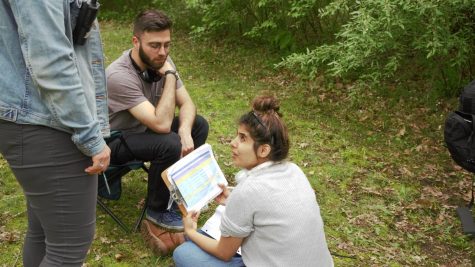Filmmaking alum Urwa Zubair taps into creative spark to make ‘something beautiful’
October 9, 2020

While walking past vibrant-colored walls and magnificently detailed creations at a Columbia art exhibit, Urwa Zubair stopped abruptly at the sight of a certain photograph.
Her gaze traveled across the canvas, noting how the two human subjects intimately shared the space, foreheads touching lightly. To Zubair, the women in the picture looked familiar, as if they were the same person: two manifestations of the same soul, she said.
This photo called “Head to Head,” taken by Kelli Connell, a professor in the Photography Department, was where she found inspiration for her thesis film project, “Silver Cord.”
Zubair, who graduated from Columbia in 2019 with a master’s degree in creative producing, is now working full time in Los Angeles, where she aspires to be a film producer while also applying for a new visa. After traveling back and forth from Karachi, Pakistan, Zubair came to the U.S. in 2017 for school.
“I think you have to be a little bit insane in order to be a filmmaker because it’s an incredibly unstable field,” Zubair said. “You have this sense of urgency, that you have to put your beliefs … out in the world at such a great level that you don’t stop.”
Growing up in Pakistan with a father in the U.S. Navy, Zubair said she developed a love for storytelling. Her family’s frequent travels ignited her curiosity and desire to understand and explore different cultures, traditions, languages and histories.
She currently works full time at GoDigital Media Group, an entertainment industry technology company, while freelancing and creating short films whenever she can.
“My filmmaking stems from a level of curiosity about all the things I don’t have knowledge of,” Zubair said.
Eric Scholl, associate professor in the Cinema and Television Arts Department, said Zubair is a meticulous producer who is on top of everything from the budget to cinematic artistry and great at working collaboratively.
“She sets her sights on what she wants and she makes things happen,” Scholl said.
He said Zubair was an exceptional student and helped curate the PakIndia Film Festival, a graduate initiative at Columbia meant to showcase films promoting stories, culture and talent from Pakistan and India.
Bridget Botchway, one of Zubair’s grad school classmates at Columbia, said she and Zubair bonded over similar cultural backgrounds while working together on projects.
“She never took anything lightly,” Botchway said. “She’s like, ‘We’re about to make this into a Hollywood production.’”
Both now live in L.A. and collaborate on everything from music videos to short films, Botchway said.
Zubair said one of the biggest and most ambitious projects she undertook at Columbia was her thesis film “Silver Cord,” about a woman trying to cope with the loss of her father and her own near-death experience.

The plot came from the idea that every human is composed of two entities—the physical body and the soul—and the “silver cord” is what connects one’s body to their soul, Zubair said.
If the cord breaks, then one dies. But if the cord pulls one’s soul back to their body again after seeing part of the afterlife, this is considered a near-death experience, she said.
Zubair said the production process was extensive, from crowdfunding thousands of dollars and rigging a pool with underwater equipment, to working with a visual effects team and overseeing different crew members.
Nicholas Graham, a graduate student studying cinema directing at Columbia, said he enjoyed working on the film because of its “enormous scope” and the way Zubair embraced his ideas.
“As a person, [Zubair] is so kind-hearted,” Graham said. “As a producer, she’s tough. She’s challenging. She’s the person you want in your corner. If something needs to get done, Urwa is on it. She’s incredible.”
Scholl, who was Zubair’s thesis film adviser, said she had multiple script drafts and refined the film to the point where she portrayed the connection between life and death in a way that was relatable and moving, but not cliché.
Several of Zubair’s films made in the past five years have been nominated and won awards internationally, including “Nanu Aur Mein,” “Arz-e-Pakistan” and “Prohibited.”
“Silver Cord” was given Columbia’s Albert P. Weisman Award, which is used to help “advanced undergraduate and graduate students complete a substantial media-based project.”
Zubair said the most invaluable thing Columbia taught her was to control her fear of failure and become more confident in her abilities.
“[Professors] were always [saying] this is the only time you can test, trial, mistake, fail and then get back up,” Zubair said. “You don’t necessarily have the same kind of opportunities when you’re out in the professional world.”
As an immigrant, Zubair said her next biggest challenge will be applying for a new visa to stay and work in the U.S.
She said the immigration process is “very draining,” and the country’s current administration is putting a limit on the number of visas given to immigrants.
Moving forward, Zubair wants to keep working on the development of her new feature film, a coming-of-age drama exploring gender expression and culture, which she intends to shoot in Pakistan in 2022.
Zubair said the most fulfilling aspect of filmmaking is seeing her creations come to life in ways that exceed her expectations.
“You get these goosebumps and chills throughout your entire body, and you know that you’ve created something beautiful for the rest of the world,” Zubair said. “Maybe only five people see it, but you’ve created something that’s going to exist for way longer than you.”







